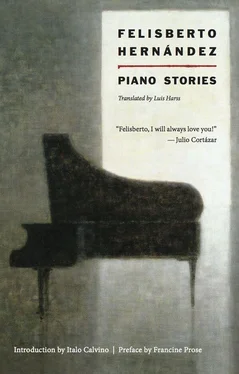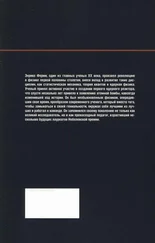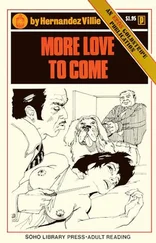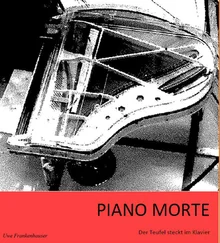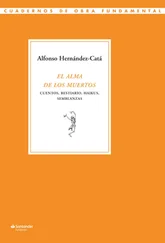Felisberto Hernandez - Piano Stories
Здесь есть возможность читать онлайн «Felisberto Hernandez - Piano Stories» весь текст электронной книги совершенно бесплатно (целиком полную версию без сокращений). В некоторых случаях можно слушать аудио, скачать через торрент в формате fb2 и присутствует краткое содержание. Год выпуска: 2014, Издательство: New Directions, Жанр: Современная проза, на английском языке. Описание произведения, (предисловие) а так же отзывы посетителей доступны на портале библиотеки ЛибКат.
- Название:Piano Stories
- Автор:
- Издательство:New Directions
- Жанр:
- Год:2014
- ISBN:нет данных
- Рейтинг книги:4 / 5. Голосов: 1
-
Избранное:Добавить в избранное
- Отзывы:
-
Ваша оценка:
- 80
- 1
- 2
- 3
- 4
- 5
Piano Stories: краткое содержание, описание и аннотация
Предлагаем к чтению аннотацию, описание, краткое содержание или предисловие (зависит от того, что написал сам автор книги «Piano Stories»). Если вы не нашли необходимую информацию о книге — напишите в комментариях, мы постараемся отыскать её.
Piano Stories
Piano Stories — читать онлайн бесплатно полную книгу (весь текст) целиком
Ниже представлен текст книги, разбитый по страницам. Система сохранения места последней прочитанной страницы, позволяет с удобством читать онлайн бесплатно книгу «Piano Stories», без необходимости каждый раз заново искать на чём Вы остановились. Поставьте закладку, и сможете в любой момент перейти на страницу, на которой закончили чтение.
Интервал:
Закладка:
“Tell Walter that’s enough for today. And have the boys come in tomorrow to rearrange the doll in the second case.”
At that moment Mary appeared:
“What’s the matter?”
“Nothing: a doll fell — the one in the lighthouse. .”
“How did it happen? Is she hurt?”
“I must have bumped into the table when I went in to look at her things. .”
“Now let’s not get upset, Horace!”
“On the contrary, I’m very happy with the scenes. But where’s Daisy? I loved the way she looked in your dress!”
“You’d better go to bed, dear,” answered Mary.
But instead they sat on a sofa, where he put his arms around her and asked her to rest her cheek on his for a moment, in silence. As their heads touched, his instantly lit up with memories of the two fallen dolls, Daisy and the girl in the lighthouse. He knew what this meant: the death of Mary. And, afraid his thoughts might pass into her head, he started to kiss her ears.
When he was alone again in the darkness of the bedroom, his mind throbbing with the noise of the machines, he thought of the warning signs he had been receiving. He was like a tangled wire that kept intercepting calls and portents meant for others. But this time all the signals had been aimed at him. Under the hum of the machines and the sound of the piano he had detected those other hidden noises scattering like mice. Then there had been Daisy falling into his arms when he opened the door to the little parlor, as if to say: “Hold me, for Mary is dying.” And it was Mary herself who had prepared the warning, as innocently as if she were showing him a disease she did not yet know she had. Just before, there had been the dead doll in the first case. Then, when he was on his way to the second case, the unprogrammed rumble of the podium, like distant thunder, announcing the sea and the woman in the lighthouse. Finally, the woman slipping out from under him, falling off her chair, condemned to be childless, like Mary. And, meantime, Walter, like a bird of ill omen, with his flapping coattails, pecking away at the edge of his black box.
II
Mary was not ill and there was no reason to think she was going to die. But for some time now he had been afraid of losing her and dreading what he imagined would be his unhappiness without her. So one day he had decided to have a doll made to resemble her. At first the result had been disappointing: he had felt only dislike for Daisy, as for a poor substitute. She was made of kidskin that attempted to imitate Mary’s coloring and had been perfumed with Mary’s favorite scents, yet whenever Mary asked him to kiss her he expected to taste leather and had the feeling he was about to kiss a shoe. But in time he had begun to notice a strange relationship developing between Daisy and Mary. One morning he saw Mary singing while she dressed Daisy: she was like a girl playing with a doll. Another time, when he got home in the evening, he found Mary and Daisy seated at a table with a book in front of them. He had the feeling Mary was teaching a sister to read, and said:
“It must be such a relief to confide in someone who can keep a secret!”
“What do you mean?” said Mary, springing up and storming out of the room.
But Daisy, left behind, held firmly in place, tipped over the book, like a friend maintaining a tactful silence.
That same night, after dinner, to prevent him from joining her on their customary sofa, Mary sat the doll next to her. He examined Daisy’s face and disliked it once more. It was cold and haughty, as if to punish him for his hateful thoughts about her skin.
A bit later, he went into the show room. At first he strolled back and forth among the glass cases. Then, after a while, he opened the big piano top, removed the bench, replaced it with a chair — so he could lean back — and started to walk his fingers over the cool expanse of black and white keys. He had trouble combining the sounds, like a drunk trying to unscramble his words. But meantime he was remembering many of the things he had learned about the dolls. Slowly he had been getting to know them, almost without trying. Until recently, Horace had kept the store that had been making his fortune. Alone, after closing time every day, he liked to wander through the shadowy rooms, reviewing the dolls in the show windows. He went over their dresses, with an occasional sidelong glance at their faces. He observed the lighted windows from various angles, like a stage manager watching his actors from the wings. Gradually he started finding expressions in the dolls’ faces similar to those of his salesgirls. Some inspired the same distrust in him, others the certainty that they were against him. There was one with a turned-up nose that seemed to say, “See if I care.” Another, which he found appealing, had an inscrutable face: just as she looked good in either a summer or a winter dress, she could also be thinking almost anything, accepting or rejecting him, depending on her mood. One way or another, the dolls had their secrets. Although the window dresser knew how to display each of them to her best advantage, at the last moment she always added a touch of her own. It was then that he started to think the dolls were full of portents. Day and night they basked in covetous looks and those looks nested and hatched in the air. Sometimes they settled on the dolls’ faces like clouds over a landscape, shadowing and blurring their expressions, and at other times they reflected back on some poor girl innocently happening by, who was tainted by their original covetousness. Then the dolls were like creatures in a trance, on unknown missions, or lending themselves to evil designs. On the night of his quarrel with Mary, Horace had reached the conclusion that Daisy was one of those changeable dolls who could transmit warnings or receive signals from other dolls. Since she lived in the house, Mary had been showing increasing signs of jealousy. If he complimented one of his salesgirls, he felt Mary’s suspicion and reproach in Daisy’s brooding look. That was when Mary had started nagging him until she got him to give up the store. But soon her fits of jealousy, after an evening in mixed company, had reached the point where he had also had to give up visiting friends with her.
On the morning after the quarrel he had made up with both of them. His dark thoughts bloomed at night and faded in the daytime. As usual, the three of them had gone for a walk in the garden. He and Mary carried Daisy between them — in a long skirt, to disguise her missing steps — as if gently supporting a sick friend. (Which had not prevented the neighbors from concocting a story about how they had let a sister of Mary’s die so as to inherit her money, and then, to atone for the sin, had taken in a doll who resembled her, as a constant reminder of their crime.)
After a period of happiness, during which Mary prepared surprises for him with Daisy and he hastened to enter them in his notebook, had come the night of the second show, with its announcement of Mary’s death.
Horace had then hit on the idea of buying his wife a number of dresses made of durable material — he intended these memories of her to last a long time — and asking her to try them on Daisy.
Mary was delighted, and he also pretended to be, when, at her urging — but in response to his subtle hints — they had some of their closest friends to dinner one night. It was stormy out, but they sat down to eat in a good mood. He kept thinking of all the memories the evening was going to leave him with and tried to provoke some unusual situations. First he twirled his knife and fork — like a cowboy with a pair of six-shooters — and aimed them at a girl next to him. She went along with the joke and raised her arms, and he tickled her shaved armpits with the knife. It was too much for Mary, who burst out:
Читать дальшеИнтервал:
Закладка:
Похожие книги на «Piano Stories»
Представляем Вашему вниманию похожие книги на «Piano Stories» списком для выбора. Мы отобрали схожую по названию и смыслу литературу в надежде предоставить читателям больше вариантов отыскать новые, интересные, ещё непрочитанные произведения.
Обсуждение, отзывы о книге «Piano Stories» и просто собственные мнения читателей. Оставьте ваши комментарии, напишите, что Вы думаете о произведении, его смысле или главных героях. Укажите что конкретно понравилось, а что нет, и почему Вы так считаете.
